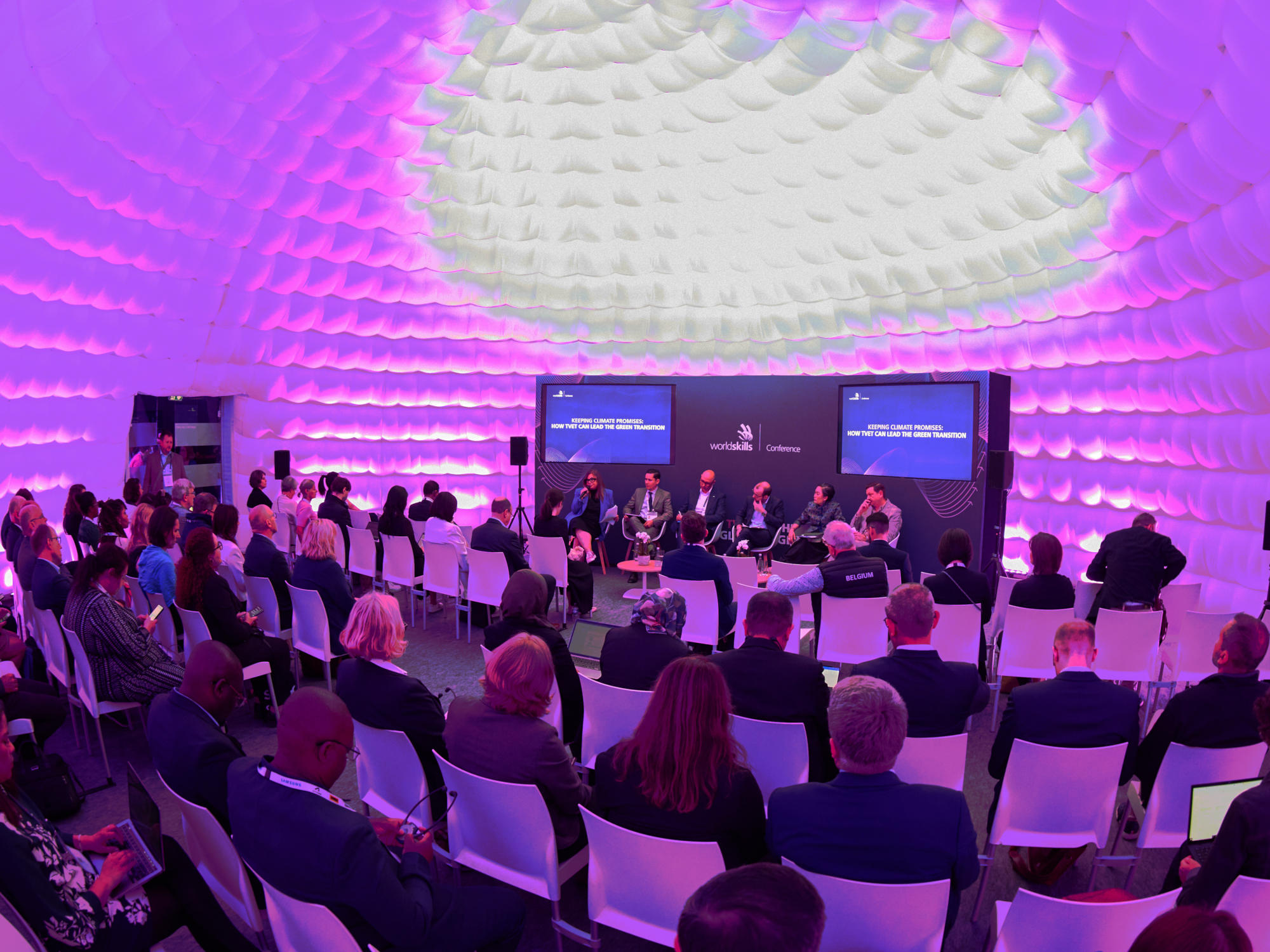Drawing on momentum from yesterday’s discussions, WorldSkills Conference 2024 explored significant topics in global skills development, including Artificial Intelligence (AI), foundational skills, and data-driven approaches to Technical and Vocational Education and Training (TVET).
AI dominated the first discussion of the day, “Can education catch up? AI and the future of work”, with technology giants and skills experts debating how TVET can keep pace with industry advancements. When moderator Georgie Ndirangu asked the panel for their perspectives on the changes we can expect to see, Mike Haley, Senior Vice President Research at Autodesk, was clear-sighted. He said, “AI is going to fundamentally change the nature of the tools we use in the world, bringing about two things. The first is that you can learn while using the tool and the software can scaffold you, and the second is that you will be able to continue learning with it through life.”
Shweta Ratanpura, WorldSkills Champions Trust representative in Asia, reminded delegates of the value of youth saying, “Young people are brilliant at adapting to tech. It keeps changing every year with new software and people are quick at picking it up. But it is not the case that we need to add a lot of things, it is more that we need to focus on the right things.”
While AI promises to revolutionize the workforce, the Conference emphasized that strong foundational skills remain crucial to emerging economies. In a session titled “Brick by brick: Foundational skills for better TVET”, Mohamad Maliki Osman, Second Minister for Education in Singapore, emphasized, “We must value students for their contribution and create a system that can respond to changes in the world today. We need to ensure the ecosystem recognizes the diversity of talent that exists and the different pathways that are possible.”
Data’s pivotal role in shaping effective TVET systems was a key focus, with the WorldSkills Global Research Council presenting its work on impact measurement in “Monitoring impact: Data for better skills systems.” Neil Bentley-Gockman, Chair of the WorldSkills Global Research Council, shared insights from a recent analysis of the WorldSkills Impact Statement Development Survey 2021.
As he presented the finding, Neil also outlined the goals of the Council saying, “Firstly, we monitor the ever-changing world of work and help WorldSkills and its members to understand it. Secondly, we develop positions to contribute to policy making and giving WorldSkills a voice in terms of the agendas. Thirdly, we monitor and conduct research on the impact of WorldSkills.”
During the afternoon, OECD shared the latest update on PISA-VET, the first international assessment for vocational programmes. Lydia Liu, Associate Vice President, Research for the Education Testing Service highlighted plans for the assessment saying, “Professional skills are complex, and this gives us a unique opportunity to innovate. That is why we are going to include interactive simulations, performance-based live assessment, and a focus on employability skills such as effective communications, collaboration, and conscientiousness that matter to the TVET occupations.”
In among the panel sessions, five social entrepreneurs took the main stage and presented a live business pitch to the assembled delegates in the BeChangeMaker 2024 finale. The much-anticipated presentations showcased the ingenuity of young people who have big ideas to address global challenges. Sekofia from Nigeria won with its SaaS platform that connects patients, healthcare providers, and insurance companies to streamline insurance processes.
Founders Ochong Johnson Aduma and Nino Chibuzor Nwachukwu said, “Getting to this point has been an amazing journey over a couple of months. The next step for us is to double down on what we have, continue our product development, and then we are hoping to launch by the end of this year. We can start scaling from there, across Nigeria and many more countries in Africa.”
In parallel, UNESCO’s Global Skills Academy celebrated four years of providing high-quality training to youth worldwide. Borhene Chakroun, Director for Policies and Lifelong Learning Systems at UNESCO stressed the need for inclusivity. He said, “We need to continue to think about skilling up those who are the most marginalized and most dramatically affected by these changes to our labour market. Just like money only going to the rich, so skills cannot only go to those who are already skilled. At the moment, less than 4% of low skilled adults engage in learning. We cannot leave anyone behind.”
Day two saw young changemakers come together in the Youth Forum to discuss the greatest and most urgent challenges facing young people in skills. Their recommendations were presented back to Conference delegates in the Closing Plenary by Yousra Assali, WorldSkills Champions Trust representative for MENA who helped close of the day with an impassioned plea to keep young people involved in the discussions.
She said, “I am here today to remind us all, that the systems that created our current problems will not be the same systems that solve them. We must think differently about the future. Young people have an important perspective that must be heard.”
David Hoey, CEO of WorldSkills International, wrapped the event with a direct request of the audience. He said, “The Conference is complete, but our work continues in haste. Whether you find yourself at the UN Summit of the Future next week, or are delivering grassroots programmes, we need you to raise this topic at every level. Continue to seek out opportunities to expand your work, find new collaborators, and work every day to elevate skills”.
As WorldSkills Conference 2024 concluded, participants departed with renewed purpose and a sharper vision for TVET’s future. Catch up on any of the sessions you might have missed at WorldSkills Conference 2024.

